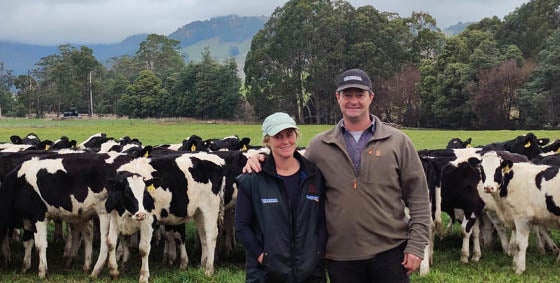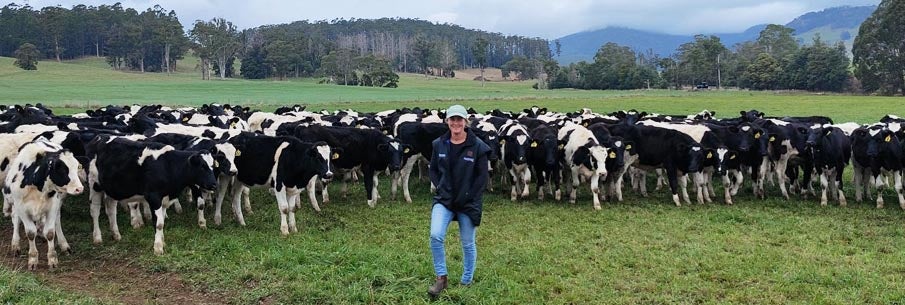Posted by on
28/05/2021
When it came to herd health on his Tasmanian dairy, for too many years Drew Carter admits he was treating the problem rather than the cause.
However a change in direction through the adoption of biological farming practices has significantly improved illness rates across his 1,500 cows, with his Friesian herd – and his budget – now benefitting from very few health issues.
“Previously on our home farm we would spend $30,000 on mastitis annually, now it is basically zero – through balancing the soil chemistry we’re achieving an abundance of minerals and nutrients in the soil, which is in turn passed onto the cattle through their feed, naturally building immunity and protecting our cows from illness.”
With the animals’ nutrition balanced, Drew said he was able to produce a superior quality, clean dairy product, at no extra cost – however was a little frustrated he was unable to charge a premium for it.
“Thankfully we’re enjoying good returns regardless, and there’s money to be made in dairy – but changing our regime did not require a large capital outlay, it wasn’t expensive to implement, the soils just needed time to get back into balance, and the results have been significant,” he said.
When it comes to managing the soil biology across his 1,500 hectares, Drew admits it all comes down to simple high school science.
“Every science student learns the nitrogen cycle and the carbon cycle at school, it’s not new, but it provides such an important foundation for balancing natural soil biology and facilitates enormous benefits for farming systems,” the Ringarooma producer said.
Drew, together with wife Kate, has been following a biological farming philosophy for the past 15 years and said that prioritising a soil chemistry and biology balance through microbiomes and other beneficials had markedly improved his soil health.
“The depth of soil has increased and we’re able to sequester a fair bit of carbon, and you can see physically how healthy the soil is thanks to the hundreds and hundreds of worms in each shovelful of dirt,” he said.
Soil was also more forgiving, he said, with less water needed for pastures to respond.
Although they follow a biological farming philosophy Drew said it was not viable to run the farm under a fully-organic regime.
The biggest stumbling block, he said, was securing organic grain reliably and consistently – and removing it all together would significantly reduce total production.
“We haven’t used any broadscale herbicides, fungicides or insecticides over the past 15 years, however we do still spot spray for thistle, however the longer we go down this path, the easier it is to manage the land.”

We also lease land to a potato grower, and any organic rules go out the window during the potato growing season.
Drew and Kate also run their own potatoes on their farm in the Winnaleah district.
“We do break our own rules for the production of potatoes – which we use to clean up rundown pastures on our second block, and we found there is just no viable alternative to support production, but we offset this by ensuring our pastures are as clean as possible.”
The Carters’ use a custom compost mix – consisting coal dust, gypsum, lime and soft rock phosphate as well as trace elements – which is applied over all paddocks annually, and add extra lime every two to three years to help maintain and balance soil chemistry, complemented by a standard compost every two years.
Drew also applies a small amount of liquid fertiliser through a Tow and Fert system – an alternative that is less toxic to the soil.
Mulching helps control weeds, and multi-species cover crops, including rye grass, clovers and plantain, increase plant diversity whilst promoting soil biodiversity.
The operation is split over three properties, the home farm at Ringarooma and an adjacent block which is undergoing development – dead trees are being cleared and a 350 megalitre dam and a 65 hectare centre pivot about to be built.
The Winnaleah farm has also undergone extensive repairs and maintenance, and the family has invested significantly on infrastructure in recent years through the development of a 870 megalitre dam and the instillation of pivots bringing the total area irrigated from 160 hectares to 250 hectares.
Each farm comprises a 60 bale fully automated dairy, with their home block including 160 hectares of irrigated pastures for the dairy platform, and soon the 65 hectares of irrigation via a pivot on the block next door, which predominantly runs young stock.
Growing all their dairy’s pasture needs on farm, it was the district’s reputation for naturally grown feed that first attracted the Carters to the district in 2001.
Both Western Australian natives, Drew was a third generation dairy farmer from SW WA, and Kate and her father were sheep and cropping farmers from Northam – each recognised the possibilities in Tasmania, sold their farms and relocated.
Drew said deregulation of the dairy industry first prompted the move, and the families soon identified the opportunity to start afresh in Tasmania where the climate and soils were best for growing grass.
And they haven’t looked back.
“We feel so fortunate to be on this biological pathway, utilising the available resources and capitalising on them, growing clean, reliable pastures largely free of artificial inputs for the purest milk and a naturally healthy herd.”
